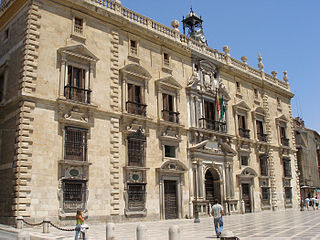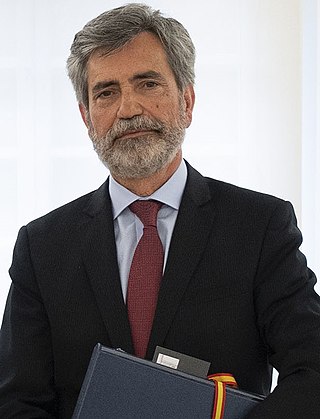
The Supreme Justice Tribunal is the highest court of law in the Bolivarian Republic of Venezuela and is the head of the judicial branch. As the independence of the Venezuelan judiciary under the regime of Nicolás Maduro is questioned, there have recently been many disputes as to whether this court is legitimate.

In most legal jurisdictions, a supreme court, also known as a court of last resort, apex court, and highcourt of appeal, and court of final appeal, is the highest court within the hierarchy of courts. Broadly speaking, the decisions of a supreme court are binding on all other courts in a nation and are not subject to further review by any other court. Supreme courts typically function primarily as appellate courts, hearing appeals from decisions of lower trial courts, or from intermediate-level appellate courts. A supreme court can also, in certain circumstances, act as a court of original jurisdiction.

The judiciary of Pakistan is the national system of courts that maintains the law and order in the Islamic Republic of Pakistan. Pakistan uses a common law system, which was introduced during the colonial era, influenced by local medieval judicial systems based on religious and cultural practices. The Constitution of Pakistan lays down the fundamentals and working of the Pakistani judiciary.

The judiciary of Portugal is a system of courts that together constitute one of the four organs of Sovereignty as defined by the Portuguese Constitution. The courts are independent from the other three Portuguese organs of Sovereignty.

The Supreme Court is the highest court in the Kingdom of Spain. The court has original jurisdiction over cases against high-ranking officials of the Kingdom and over cases regarding the legalization of political parties. It also has ultimate appellate jurisdiction over all cases. The Court has the power of judicial review, except for the judicial revision on constitutional matters, reserved to the Constitutional Court.

The judiciary of Colombia is a branch of the State of Colombia that interprets and applies the laws of Colombia, to ensure equal justice under law, and to provide a mechanism for dispute resolution. The judiciary comprises a hierarchical system of courts presided over by judges, magistrates and other adjudicators.

The Supreme Court of Costa Rica is the court of greater hierarchy of Law and Justice in Costa Rica.

The High Court of Justice of Galicia is the highest body and last judicial instance in the Galician jurisdiction, integrating the Spanish judiciary. Together with the Parliament of Galicia and the Galician Government, the TSXG is one of the three main institutions representing Galicia's self-government, as established and regulated by the Galician Statute of Autonomy of 1981.

The Judiciary of Spain consists of Courts and Tribunals, composed of judges and magistrates (Justices), who have the power to administer justice in the name of the King of Spain.

The High Court of Justice of Andalusia, Ceuta and Melilla, is the highest court of Andalusia, and for the Spanish autonomous cities of Ceuta and Melilla. Its seat is the former Royal Chancery of Granada. The TSJA has full power over all the jurisdictional orders: civil and penal law, social law, administrative disputes, and any other orders that may be created in the future.

The judiciary of Italy is composed of courts and public prosecutor offices responsible for the administration of justice in the Italian Republic. These offices are occupied by judges and prosecutors respectively, who are known as magistrates. Magistrates belong to the magistracy, that is to say a branch of the State that may only be accessed by Italian citizens who hold an Italian Juris Doctor and successfully partake in one of the relevant competitive public examinations organised by the Ministry of justice.

The superior courts of justice, or high courts of justice, are courts within the judicial system of Spain, whose territorial scope covers an autonomous community, as laid down in the Organic Law of Judicial Power.

The High Court of Justice of Catalonia is the highest body and last judicial instance of the Spanish judiciary in Catalonia. Unlike the Parliament of Catalonia or the Executive Council of Catalonia, the TSJC is not a part of the Generalitat of Catalonia, the autonomous system of self-government of the community, although the Catalan government has some powers over it, especially in material resources.

Carlos Lesmes Serrano is a Spanish magistrate and prosecutor who served as president of the Supreme Court and president of the General Council of the Judiciary (CGPJ) from 2013 to 2022. Since December 2018, he served in acting capacity in both posts, as his mandate expired at the time and the renovation of the CGPJ was blocked from then on. He is seen as a Conservative jurist with a religious background.

The High Court of Justice of Cantabria (TSJC), is the highest court of the Spanish judiciary in the Autonomous Community of Cantabria. Established pursuant to Title VIII of the Spanish Constitution, it has original jurisdiction over cases against high-ranking officials of the autonomous community and appellate jurisdiction over all cases. The TSJC decisions may be appealed to the Supreme Court. It also has entrusted the resolution of conflicts of competence between courts in Cantabria. The Court has the power of judicial review over norms with lower rank than the law of the regional administrations.
The Supreme Tribunal of Justice of Venezuela (TSJ) in exile is an institution that some, including the Organization of American States, consider to be the legitimate highest court of law in Venezuela and the head of the judicial branch, as opposed to the Supreme Tribunal of Justice. It was established on 21 July 2017 following the 2017 Venezuelan constitutional crisis. The TSJ's 33 members have been based in Chile, Colombia, Panama, and the United States due to the political crisis in Venezuela.
The Vice President of the Supreme Court is the second highest authority of the Supreme Court of Spain and its main duty is to support and replace the President as head of the Court. The vice president is appointed by the Monarch after being nominated by the General Council of the Judiciary at the proposal of the president of the council. It has a term of five years.
Julio Márquez de Prado Pérez, was a Spanish magistrate, president of the Extremaduran High Court of Justice between 2004 and 2020.
The High Court of Justice of the Canary Islands is the highest organ of the judicial power in the autonomous community of Canary Islands (Spain). It has its seat in Las Palmas de Gran Canaria.















